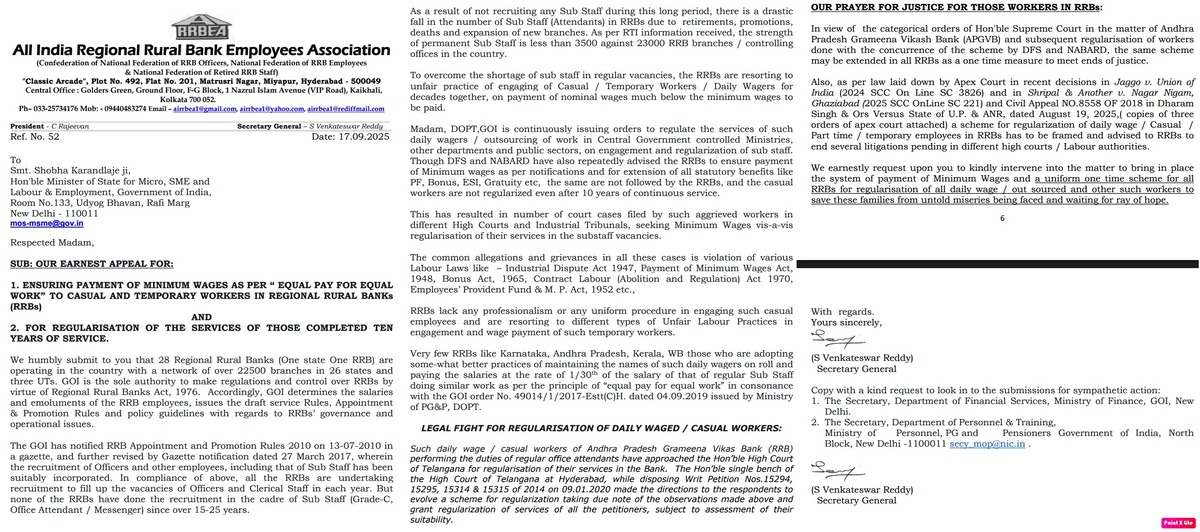“Equal Pay for Equal Work”: AIRRBEA Writes to MoS Shobha Karandlaje Demanding Justice for Temporary Workers in RRBs
AIRRBEA seeks govt action to ensure minimum wages and regularisation of long-serving RRB casual workers, citing key Supreme Court rulings.

Author: Saurav Kumar
Published: September 22, 2025
The All India Regional Rural Bank Employees Association (AIRRBEA) has appealed to the Union government to ensure payment of minimum wages to casual and temporary workers in Regional Rural Banks (RRBs), invoking the principle of “equal pay for equal work.” The association has also demanded regularisation of services for those who have completed over ten years of continuous work.
Advertisement
“We Appeal to the Minister to End Decades of Neglect”
Advertisement
In a letter dated September 17, 2025 to Minister of State for MSME and Labour & Employment, Shobha Karandlaje, AIRRBEA urged urgent intervention, noting that thousands of casual workers in RRBs are being paid below statutory minimum wages and denied benefits like PF, ESI, gratuity, and bonus. “We appeal to the minister to end decades of neglect by ensuring fair wages and regularisation of long-serving temporary staff,” said the AIRRBEA letter.

Image: AIRRBEA letter to MoS Shobha Karandlaje on regularisation of temporary workers
Advertisement
Judiciary Recognising Temporary Workers
Talking to Kanal, AIRRBEA Secretary General S. Venkateswar Reddy said, “In the recent past, three major court orders have come in favour of regularising temporary workers. These rulings give a strong boost to our long struggle, and we have urged the Government of India to act on them as rightful precedents supporting the cause of RRB workers.”
He further added, “RRBs operate under a single law — the RRB Act of 1976 — yet temporary workers are treated under different rules across banks. We are demanding a Uniform One-Time Scheme to ensure regularisation and justice for all such employees.”
Court Judgments Strengthen Workers’ Case
The association cited multiple rulings to press its case, including:
- The Telangana High Court and Supreme Court directions in the Andhra Pradesh Grameena Vikas Bank case, which led to the regularisation of nearly 500 daily wage workers.
- The Supreme Court’s 2024–2025 rulings in Jaggo v. Union of India, Shripal v. Nagar Nigam Ghaziabad, and Dharam Singh v. State of U.P, which reaffirmed that long-serving temporary employees performing perennial duties should be considered for one-time regularisation.
These judgments, AIRRBEA noted, underscore that engaging workers on a temporary basis for decades, while extracting regular work, violates Articles 14, 16, and 21 of the Constitution.
Telangana Grameena Bank (TGB) and the erstwhile Andhra Pradesh Grameena Vikas Bank (eAPGVB) have already implemented such rulings, regularising hundreds of temporary staff after court directives. AIRRBEA emphasised that these victories were not overnight developments but the outcome of a decades-long struggle, reinforcing its demand for a uniform national policy to end prolonged exploitation of casual workers across RRBs.
Call for One-Time National Scheme
AIRRBEA has demanded that the Ministry of Finance, Department of Financial Services (DFS), and NABARD should introduce a uniform one-time scheme for all 28 RRBs to regularise daily wage, casual, and temporary staff. The association argued that such a measure would not only uphold labour justice but also prevent the flood of litigations pending in High Courts and labour tribunals across states.
“Thousands of families of casual workers are facing untold miseries despite serving banks for over a decade. It is time the government extended fairness and dignity by granting them minimum wages and secure employment,” AIRRBEA said.
In recent years, the plight of temporary workers has gained sharper focus as AIRRBEA secured key legal victories that led to the regularisation of hundreds of employees in select RRBs. Yet, the larger issue remains unresolved. Addressing these long-pending challenges, the association stresses, is not just about workers’ welfare but is essential for ensuring the stability and seamless functioning of RRBs.
No comments yet.
